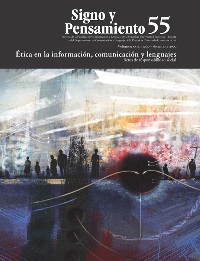Resumen
Este artículo sintetiza el aprendizaje adquirido por el autor a lo largo de veinte años de experiencia en la fascinante tarea de enseñar ética a estudiantes universitarios de tecnología. El autor inicia el texto señalando la distinción entre éticas normativas y éticas de la responsabilidad; se manifiesta abiertamente a favor de las segundas pero defiende su conciliación con las primeras, puesto que son las que predominan en el mundo donde los jóvenes profesionales van a actuar. Partiendo de este supuesto, el resto del artículo trata de explicar cómo el imperativo categórico de Kant, el modelo de desarrollo moral de Kohlberg y las propuestas de Floridi con respecto a la ética de la información se pueden poner al servicio de esa conciliación.
Covey, S. (1992). The Seven Habits of Highly Effective People, Londres, Simon & Schuster.
Figueiredo, A. D., & Cunha, P. R. (2007). Action Research and Design in Information Systems: Two Faces of a Single Coin. In Ned Kock (Ed.) Information Systems Action Research: An Applied View of Emerging Concepts and Methods (pp. 61-96). Springer.
Floridi, L. (1998). “Information Ethics: On the Philosophical Foundations of Computer Ethics”, Proceedings ETHICOMP98, The Fourth International Conference on Ethical Issues in Information Technology, Erasmus University.
Floridi, L. (2003). On the Intrinsic Value of Information Objects and the Infosphere. Ethics and Information Technology, vol. 4, núm. 4, pp. 287-304.
Floridi, L. (2006). A Look into the Future Impact of ICT on Our Lives. The Information Society, vol. 23, núm. 1, pp. 59-64.
Kant, I. (1964). The Groundwork of the Metaphysic of Morals. H. Paton. Kohlberg, L. (1971). From Is to Ought: How to Commit the Naturalistic Fallacy and Get Away with It in the Study of Moral Development. Academic Press.
Kohlberg, L. (1973). “The Claim to Moral Adequacy of a Highest Stage of Moral Judgment”. Journal of Philosophy, vol. 70, pp. 630-646.
Schön, D. (1983). The Reflective Practitioner: How Professionals Think in Action. London, Temple Smith.
Shafer, W. D., Swanson, G., Bene, N. & Newberry, G. (2001). Effects of Teacher Knowledge of Rubrics on Student Achievement in Four Content Areas. Applied Measurement in Education, vol. 14, num. 2, pp.151-170.
Smith, H. J. e Hasnas, J. (1999). “Ethics and Information Systems: The Corporate Domain”, MIS Quarterly, vol. 23, num. 1, pp. 109-127.
Varela, F. (1992). Un Know-How per l’Ética. Roma-Bari, Gius, Laterza & Figli Spa.
Vygotsky, L.S. (1978). Mind and society: The development of higher psychological processes. Cambridge, MA, Harvard University Press.
PÁGINAS WEB
ACM (1992). “ACM Code of Ethics and Professional Conduct” [em linha], disponível em: http:// www.acm.org/about/code-of-ethics, recuperado: 29 de Julho de 2009.
AIS (2003). “AIS Code of Research Conduct” [em linha], disponível em: http://home.aisnet.org/ displaycommon.cfm?an=1&subarticlenbr=15, recuperado: 29 de Julho de 2009.
Center for Business Education. “Giving Voice to Values” [em linha], disponível em: http:// www.aspencbe.org/teaching/gvv/index.html, recuperado: 29 de Julho de 2009.
IEEE (2006). “Code of Ethics” [em linha], disponível em: http://www.ieee. org/portal/pages/iportals/ aboutus/ethics/code.html, recuperado: 29 de Julho de 2009.
Institute for Global Ethics. “Dilemmas” [em linha], disponível em: http://globalethics.org/dilemmas. php, recuperado: 29 de Julho de 2009.
UNESCO (2007). “Ethics and human rights in information society” [em linha], disponível em: http://portal.unesco.org/ci/en/ ev.php-url_id=24772&url_do=do_topic&url_ section=201.html, recuperado: 29 de Julho de 2009.
Esta revista científica se encuentra registrada bajo la licencia Creative Commons Reconocimiento 4.0 Internacional. Por lo tanto, esta obra se puede reproducir, distribuir y comunicar públicamente en formato digital, siempre que se reconozca el nombre de los autores y a la Pontificia Universidad Javeriana. Se permite citar, adaptar, transformar, autoarchivar, republicar y crear a partir del material, para cualquier finalidad (incluso comercial), siempre que se reconozca adecuadamente la autoría, se proporcione un enlace a la obra original y se indique si se han realizado cambios. La Pontificia Universidad Javeriana no retiene los derechos sobre las obras publicadas y los contenidos son responsabilidad exclusiva de los autores, quienes conservan sus derechos morales, intelectuales, de privacidad y publicidad.
El aval sobre la intervención de la obra (revisión, corrección de estilo, traducción, diagramación) y su posterior divulgación se otorga mediante una licencia de uso y no a través de una cesión de derechos, lo que representa que la revista y la Pontificia Universidad Javeriana se eximen de cualquier responsabilidad que se pueda derivar de una mala práctica ética por parte de los autores. En consecuencia de la protección brindada por la licencia de uso, la revista no se encuentra en la obligación de publicar retractaciones o modificar la información ya publicada, a no ser que la errata surja del proceso de gestión editorial. La publicación de contenidos en esta revista no representa regalías para los contribuyentes.


